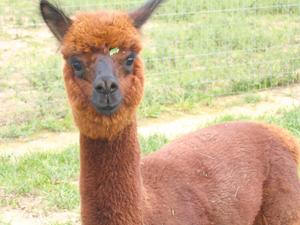 |
|
Raising Alpacas Is Gaining an Acceptanceby KRISTEN ARMSTRONG,Staff Writer |
|
| Although traditional animals,
like horses and cattle, might still dominate livestock farming in Hunt
Country, raising alpacas is a growing trend, and two local alpaca
farmers recently shared their knowledge and thoughts on the industry
with Middleburg Life: For Ben Rogers, general manager of Heronwood Farm in Upperville, raising alpacas has been a very positive experience that he recommends to many farmers. The relatives of llamas (alpacas are about half the size of them) are not only low-maintenance and friendly, they also are financially beneficial for the farm, he said. Heronwood owner Robert Smith began his investment in alpacas in March 2000, after selling his interest in horses in 1999. While the farm boards horses and has a polo team, Smith “still wanted animals on the farm for tax purposes, but wanted something that his family and grandchildren had an interest in,” Rogers said. The answer was alpacas. Not only are they gentle and friendly, they also are very low maintenance, produce a renewable resource and require very little space. Of the 600 acres Rogers oversees, only 20 are needed for the farm's 64 alpacas. They eat only a cup of feed a day, do not need blankets in the winter because of their fleece, only require run-ins and are very clean (the herd all goes to the bathroom in the same place). Alpacas are “a big part of the farm,” Rogers said. “We wanted to diversify, and didn't want all our eggs in one basket. There's a whole new string of revenue with alpacas.” The farm sells alpaca fleece products, from sweaters and scarves to socks and teddy bears. The alpacas themselves also are for sale, and can bring in a hefty sum. The average price for bred females hovers around $20,000 and have been known to sell for up to $305,000. Males have been sold for $750,000, Rogers said. The alpacas are shown about six or seven times a year all across the country. One of the female alpacas, Sunset Jewel, is the winner of eight championships. Heronwood offers breeding services, and will help those interested in alpacas set up their farms. And what advice does Rogers have for potential alpaca farmers? “Educate yourself. Visit as many farms as you can,” he said. “Buy from a reputable breeder. You get what you pay for.” Keith Bryan, a mortgage loan banker for Beach First National Bank, may not be a farmer, but he knows a good opportunity when he sees one. And raising alpacas definitely seemed to fit the bill. Bryan and his family moved to Middleburg in 2001 and “did a lot of research on a plethora of different businesses to use some of the land,” he said. With a wife and two kids, Bryan wanted to find animals to raise that were gentle, docile and low-maintenance. Qualifying for tax deductions and providing a potential income also were factors in his search, and the clear winner was alpacas, he said. “The alpaca market, unlike the mortgage business, since its inception in the '80s has had very consistent growth and appreciation,” Bryan said. Bryan has been raising alpacas for three years, and is in the early stages of the business, but his animals already have won numerous blue ribbons, and he will begin selling fleece products during this year's fall farm tour. Bryan currently has 10 alpacas on his farm, Aplacas of Middleburg, and credits his success so far to investing in high-quality animals from the get-go and learning as much about alpacas and the industry as possible. “Do your due diligence. Work with local farms, because of the support you'll need the first year,” he said. “These animals are smart. They're intelligent and a little coy.” The alpacas haven't only been a hit with Bryan, but his whole family has fallen in love with them. His daughters visit them every day, “even though the alpacas probably don't want them to visit every day,” Bryan joked. Bryan plans on enlarging his alpaca business, and has his next steps all planned out. He actually has his farm for sale, so he can find a larger property. “I enjoy it. It's fun,” he said. “I would love to do it full time.” Both Heronwood Farm and Alpacas of Middleburg will be open during the fall farm tour. Some facts you might not know about alpacas: * Alpacas were first introduced to the United States in 1984. * There are two types of alpacas - the Huayaca and the Suri. Suris are more rare and have longer, silkier fleece fibers than Huayacas. * Alpaca fleece is four times warmer than wool, and softer than cashmere. * One alpaca can produce up to 10 pounds of fiber a year. * The United States recognizes 22 fleece colors. * Alpacas' feet are padded like those of dogs, and do little damage to their pastures. * Alpacas have three stomachs. * Alapacas generally live about 20 years. * They can be pastured at five to 10 per acre. - Kristen Armstrong |
 Raising alpacas has proven to be a successful and enjoyable venture for Heronwood Farm general manager Ben Rogers and Alapacas of Middleburg owner Keith Bryan. (Photo by Kristen Armstrong) |